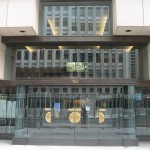Developing Networks for Development: where do we fit in?
The United Nations Industrial Development Organization is a small branch of the World Bank, but it does big work. For the past six years or so, UNIDO has examined how networks between individuals, organizations, businesses, and governments affect economic growth and development.
When they began, there were only a few points of consensus about development economics: 1) that no universal solution to growth exists, 2) that knowledge is the key to effective policy-making, 3) that there are global public goods, 4) that inclusive governance systems are necessary to growth, and 5) that there needs to be South-South triangular cooperation. In all of the data they pulled together from a variety of countries and organizations, they found a steady positive correlation between the level of interconnectedness and intra-connectedness of countries and their citizens, and GDP per capita/government effectiveness: The more connected a government, businesses, organization, and individuals in a country were, the higher they landed in any economic index.
From all of the graphs and data the World Bank has presented, it is clear that there must be some relationship between networks & economic growth and government transparency & effectiveness. Building networks requires ample time and resources. Like growing an orchard, one cannot expect seedlings to give fruit after a year. Likewise, networks need time to take root and mature before endowing their benefits. At the release of fresh Networks for Prosperity information at the World Bank, a representative of Costa Rica, which ranks about the same as China in term of density and quality of networks, made the above point admirably. He said that networks are more of a force in Middle Income Countries (MICs) because those countries have diversified industries outside of the primary sector of agriculture and mining. This means that networks have the potential to bring even more business into the state as a matter of agglomeration and assurance that the government will not change policies abruptly after a company begins operation. A well educated populace able to take advantage of non-primary sector jobs combined with a transparent, well-connected government means less social unrest, which then leads to greater investment opportunities and so on.
So what can the global Wikimedia movement do to tap into this particular field of networks and make a positive difference globally? Wikipedia can already be accessed on mobile technology, and partnerships with mobile providers, like Orange and Telenor, allow for people in the Middle East & North Africa, and Asia & Southeastern Europe to access Wikipedia and all of its information for free. So we know that there are ways to get important information to people on mobile technology without costs to them. Combine that with the fact that the 87% of the world’s population will have mobile subscriptions by 2015, and what you have is a well-established network that can be an instrumental part of getting the right kind of information to the right people in accessible ways. One particular suggestion for utilizing the reach of that network (brought up during individual discussions at the event) was the possibility of creating a gov.wiki or a similar project as a space for governments and International Governmental Organizations (IGOs) to post their policies clearly, and where citizens can comment on how those policies are implemented on the ground.
Wikimedia DC is working on building relationships with various organizations, non-profits, government institutions, and embassies to coordinate edit-a-thons and hack-a-thons, along with cultural and educational events to engage local Wikipedians and Wikimedians and encourage new individuals to join the global knowledge movement. The support of this large community will help us to continually update and improve the world’s largest encyclopedia and its related projects.
To access the Networks for Prosperity report, you can visit (PDF link): http://www.unido.org/fileadmin/user_media/News/2011/UN%20Report%20LowRes.pdf
Lisa Marrs, Outreach & Program Coordination, Wikimedia DC
